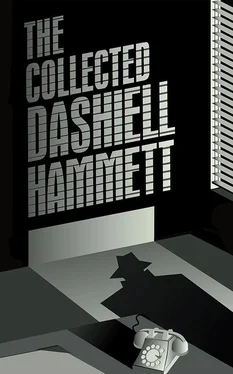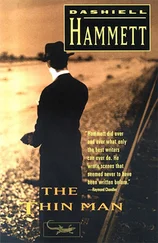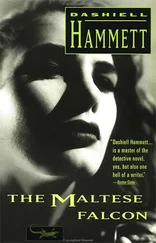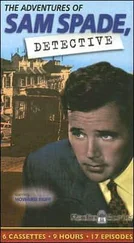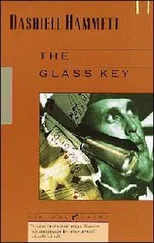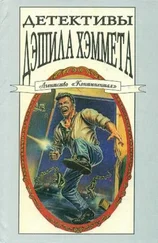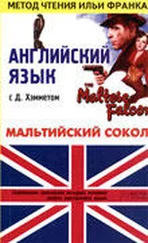“What the hell, Itchy?” Pete Judge demanded. “You must of put on the high hat for them guys! What’s a debonair?”
“That’s a lot of bunk!” Itchy protested with warmth. “I didn’t make no cracks that that kind of stuff could be got out of. I went in there and flashed the rod, and said, ‘Get in there, all of you,’ pointing to the box. The stenog — one of them goofy kids — has me worried for a minute. I’m afraid she’s going to try to be funny, or let out a squawk, or something: she’s got that kind of look in her eye. So I tell her, sharp, ‘Now you run along with ’em, sister, I don’t want to have to hurt you.’ She goes, I slain the door on them, make the till, and duck out to you. That’s all there was to it. It’s these newspapers! Like making it twenty-five centuries, when eighteen hundred was all we got.”
Pete’s mouth widened in a grin at the earnestness of this defense, a grin which, for all its breadth, did not tighten his lips appreciably, or give them the least semblance of resilience.
“You ought to get yourself some spats and one of these here monocles. Ain’t no use of doing things half-way. Funny I never rapped to it that I was throwing in with a dude!”
Itchy scowled at his partner and picked up another paper. In this one also the robbery held a place of honor on an outside sheet that was a shade paler pink than the one he had just read aloud, but nothing was said here of the bandit’s comity. So Itchy read it to Pete, and then the third version, — against a background of green, this one, — likewise devoid of objectionable adjectives.
But Pete was not to be denied his humor.
“I guess I better shake up the scoffings, Mister Maker,” he said as he carried the packages he had brought in with the afternoon papers over to the gas stove in a corner of the room. “You oughtn’t to spoil your lily-white hands with cooking. It ain’t debonair.”
Itchy returned his stockinged feet to the window sill, leaning back in his chair and lighting a cigarette with a pretense of vast indifference to the witticisms that came over his partner’s shoulder between the rattling of pans. He was sorry he hadn’t laughed with Pete at first. No use giving Pete a chance to ride him: Pete would make a song of it. But it was too late now.
Those damn reporters, twisting things around, trying to be funny! “Debonair,” whatever that was, “politely,” “culture,” “refinement.” He’d show them! Next time he’d dent somebody’s skull, and let them see what they could make out of that. And as for Pete, — who had by now discarded “Mister” Maker in favor of “Debonair” Maker, — if Pete kept this up he was going to get smacked. That was all!
In a touring car stolen that morning, Itchy and Pete caught up with the automobile they had trailed from broom factory, to bank, and now half-way back to factory. They drew abreast of it, slackened their own to its pace, and edged over toward it, forcing it against the curb. There was a moment of hesitancy on the part of the three men in the factory car, then obedience, and a bag of money, meant until now to cover a payroll, changed cars. Nothing remained to the robbery except the escape.
Itchy, however, did not immediately give the word for Pete to drive on. He remembered his self-given promise to slug somebody next time, that his reputation might be redeemed from the calumny of gentility. He could easily swing the weapon in his left hand into the scared fat face of the nearest factory employee — maybe knock some of his teeth out.
He screwed around in his seat a little, for better leverage, and Pete’s breath rasped in his ear. Pete was a partner to be trusted without stint: no matter how badly frightened Pete might be he would hold up his end, wouldn’t dog it in a pinch. But Pete was always scared. He was without joy in his vocation. He knew nothing of exaltation in the power of a crooked forefinger to take what it wanted from the world. Robbery was to him — exclusive of the money involved, and even that was powerless to stimulate him during the actual operation — no more pleasant than to his prey. And to Pete this lingering to no purpose when the work was done was agony.
Itchy, in the pride of his own imperturbable subnormality, found inspiration in the hoarse panting beside him. Pete had ridden him ragged about the Oakland job, had he? Had called him a dude, had he? Called him “Itchy the debonair”? He’d give Pete a bellyful this time!
“I regret exceedingly,” Itchy told the factory employees, “the necessity of having to do this” — hazy remembrance of a letter he had once received from a collecting agency carried him this far — “and I hope — I trust you boys won’t do nothing you’ll be sorry for.”
Pete had enough. He bent over the wheel, and they shot up Mission Street, Itchy leaning out to call back: “I bid you good-day!”
How did Pete like that?
But Pete didn’t say whether he liked it or no. He said nothing about it, even when they were safely at home again. Toward evening he went out for groceries, and did not come back. He had his share of the loot. He and Itchy had been together for nearly a year: seven or eight months on the road, and the last few “jungling up” in this housekeeping room on Ellis Street. Pete liked Itchy, and in association with him had prospered as never before. But Pete had had experience with partners who became swollen with success, and he did not intend being involved in the ensuing wreckage this time.
Itchy waited an hour, and then went down to the corner for food and the afternoon papers. He understood now why Pete hadn’t raised a row over the hold-up. Well, if Pete didn’t like his style, all right. He could find another partner, or perhaps he’d be better off working alone. He had done all the real work anyway, — the actual going up against the gun, — though Pete had been handy with a car.
Itchy read the afternoon papers before he cooked his meal. They were unanimous now: the paler pink and the green anxious to make up for their oversight of the previous month, and the deeper pink secure in the confirmation of its original stand. The bandit, they agreed, was the same who had robbed the Oakland bank, and he was a gentleman crook, a brother to those suave dandies of fiction who so easily confound the best policing brains of the several continents.
Fiction, Itchy knew, meant stories, books. He had never thought of stories having any connection with actuality, any relation with life; but it seemed that they did, and not only with life but with him personally. Books had been written about men like him; that was what the newspapers were getting at.
There is a stratum of American criminal society whose constituents — almost without exception either bandits or burglars; the latter, once predominant, now a dwindling minority — are primarily hoboes. They have all the caste consciousness of those wanderers, all their contempt for the niceties of gentler modes of life. You will find them in the cities often, but they bring with them all their pride in their hardness, in their independence, in their ability to do for themselves whatever needs to be done.
The tawdry resort of the town criminal seldom sees them: even before Prohibition came they preferred to buy their liquor in the form of pure alcohol, which they could dilute to their taste; they affect a fine disesteem for women, and their contacts with them are infrequent and brief. Their ideal abode in a city is a house in some shoddy suburban quarter, or, if that is not practicable, a flat, or a room with a stove, where they may live free of traffic with cooks and other devices of civilisation. In short, they are outcasts and that is their pride. And they like to treat a city as if it were not a city at all, but merely another sort of countryside.
Читать дальше
